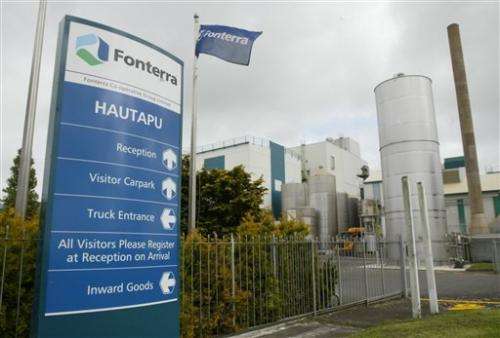In this Oct 14, 2004 photo, Fonterra's Hautapu dairy factory is seen in the Waikato, New Zealand. New Zealand authorities have triggered a global recall of up to 1,000 tons of dairy products across seven countries after Fonterra, the world's fourth-largest dairy company, announced tests had turned up a type of bacteria that could cause botulism. New Zealand's Ministry of Primary Industries said Saturday, Aug. 3, 2013 that the tainted products include infant formula, sports drinks, protein drinks and other beverages. It said countries affected beside New Zealand include China, Australia, Thailand, Malaysia, Vietnam and Saudi Arabia. (AP Photo/New Zealand Herald, Greg Bowker)
(AP)—A botulism scare has prompted China and Russia to stop importing New Zealand milk powder and other dairy products, denting the country's reputation as a supplier of safe, high quality food.
New Zealand dairy giant Fonterra announced Saturday that up to 1,000 tons of infant formula, sports drinks and other products sold in seven countries could be tainted after tests found bacteria in whey protein concentrate that could cause botulism.
The import bans in Russia and China extend beyond the products now being specifically targeted for recall. How long those trade halts last could indicate the extent of the damage to New Zealand's reputation as a source of top-quality dairy products.
Dairy and other agricultural exports power the country's economy, and China is its single biggest export market. An indication of how serious the threat is to New Zealand's trade came over the weekend, when the government assigned 60 officials to work on the botulism scare. Fonterra is the world's fourth-largest dairy company, with annual revenue of about $16 billion.
There have been no reported illnesses as a result of the contamination. The Centers for Disease Control describes botulism as a rare but sometimes fatal paralytic illness caused by a nerve toxin.
The scare prompted the New Zealand dollar to drop about two cents against the U.S. dollar, from 79.3 cents Friday before the announcement to 77.2 cents Monday morning.
A senior New Zealand official said Monday that China had halted imports of all Fonterra milk powder and whey products, whether those products were exported from New Zealand or Australia.
Russia has imposed a wider ban on all New Zealand dairy products even though it wasn't among the countries to receive any of the tainted products, said Scott Gallacher, acting director-general of the Ministry for Primary Industries.
"We do face some market closures," Gallacher said.
He said government officials are seeking clarity from their Russian counterparts. He said China's response was more understandable, given the situation.
"China has not closed the market to all New Zealand dairy products, it has been quite specific about the range of Fonterra products which it has temporarily suspended," Gallacher said. "The Chinese authorities still have a number of questions, which we are wanting to work with them on to respond to."
China hasn't made any official announcement about the import ban, but it did publicize the names of four companies that had imported products that may have been contaminated.
The official Xinhua News Agency said Hangzhou Wahaha Health Food Co. Ltd., Hangzhou Wahaha Import & Export Co. Ltd., Shanghai Tangjiu (Group) Co. Ltd. and Shanghai-based Dumex Baby Food Co. Ltd. on Sunday began recalling and sealing products with allegedly contaminated whey protein.
Consumers in China and elsewhere have been willing to pay a premium for New Zealand infant formula because the country has a clean and healthy reputation. Chinese consumers have a special interest after tainted local milk formula killed six babies in 2008.
New Zealand company Nutricia and Malaysia's Danone Dumex have announced recalls of some types of infant formula. Thai officials expect to make an announcement Monday.
Fonterra said some of its potentially contaminated whey protein was purchased by Coca-Cola and Australian health food company Vitaco but the manufacturing process used by those companies, including ultra-high temperature treatment, meant their products posed no risk. It said the same situation applied to Chinese beverage maker Wahaha.
Coca-Cola said in a statement that it used 25 kilograms (55 pounds) of the tainted protein in one batch of pineapple-flavor Minute Maid "Pulpy Milky" which was shipped to three provinces in China.
"External scientific authorities and our internal experts have reconfirmed that our products are safe," the company said. "This is due to the ultra-high temperature manufacturing process we use, and also the low acidity, which sanitizes the final product."
© 2013 The Associated Press. All rights reserved.



















